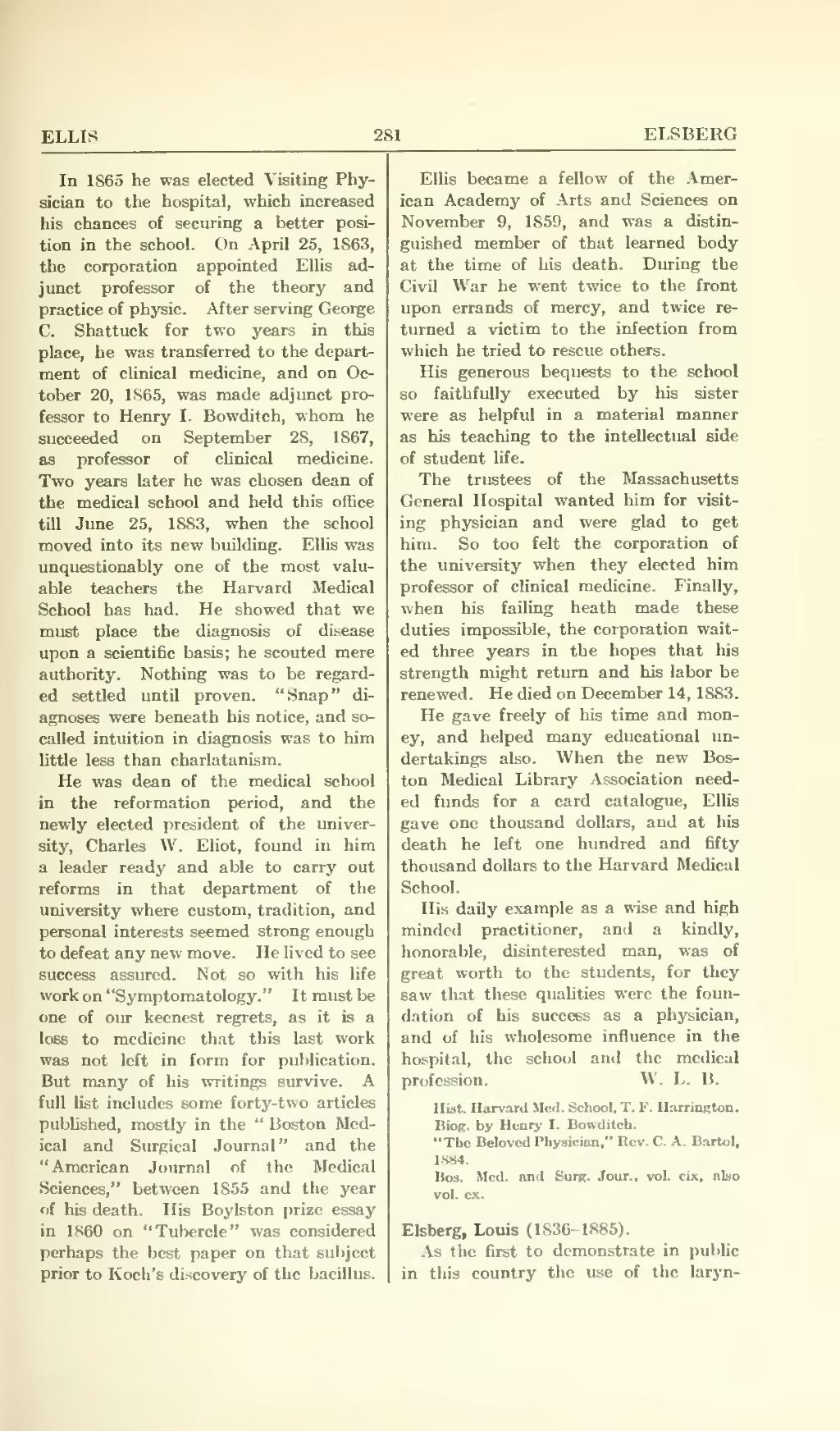ELLIS
ELSBERG
In 1865 he was elected Visiting Phy-
sician to the hospital, which increased
his chances of securing a better posi-
tion in the school. On April 25, 1S63,
the corporation appointed Ellis ad-
junct professor of the theory and
practice of physic. After serving George
C. Shattuck for two years in this
place, he was transferred to the depart-
ment of clinical medicine, and on Oc-
tober 20, 1865, was made adjunct pro-
fessor to Henry I. Bowditch, whom he
succeeded on September 2S, 1867,
as professor of clinical medicine.
Two years later he was chosen dean of
the medical school and held this office
till June 25, 1883, when the school
moved into its new building. Ellis was
unquestionably one of the most valu-
able teachers the Harvard Medical
School has had. He showed that we
must place the diagnosis of disease
upon a scientific basis; he scouted mere
authority. Nothing was to be regard-
ed settled until proven. "Snap" di-
agnoses were beneath his notice, and so-
called intuition in diagnosis was to him
little less than charlatanism.
He was dean of the medical school in the reformation period, and the newly elected president of the univer- sity, Charles W. Eliot, found in him a leader ready and able to carry out reforms in that department of the university where custom, tradition, and personal interests seemed strong enough to defeat any new move. He lived to see success assured. Not so with his life work on "Symptomatology." It must be one of our keenest regrets, as it is a loss to medicine that this last work was not left in form for publication. But many of his writings survive. A full list includes some forty-two articles published, mostly in the " Boston Med- ical and Surgical Journal" and the "American Journal of the Medical Sciences," between 1855 and the year of his death. His Boylston prize essay in 1860 on "Tubercle" was considered the best paper on that subject prior to Koch's discovery of the bacillus.
Ellis became a fellow of the Amer-
ican Academy of Arts and Sciences on
November 9, 1859, and was a distin-
guished member of that learned body
at the time of his death. During the
Civil War he went twice to the front
upon errands of mercy, and twice re-
turned a victim to the infection from
which he tried to rescue others.
His generous bequests to the school so faithfully executed by his sister were as helpful in a material manner as his teaching to the intellectual side of student life.
The trustees of the Massachusetts General Hospital wanted him for visit- ing physician and were glad to get him. So too felt the corporation of the university when they elected him professor of clinical medicine. Finally, when his failing heath made these duties impossible, the corporation wait- ed three years in the hopes that his strength might return and his labor be renewed. He died on December 14, 1S83.
He gave freely of his time and mon- ey, and helped many educational un- dertakings also. When the new Bos- ton Medical Library Association need- ed funds for a card catalogue, Ellis gave one thousand dollars, and at his death he left one hundred and fifty thousand dollars to the Harvard Medical School.
His daily example as a wise and high minded practitioner, and a kindly, honorable, disinterested man, was of great worth to the students, for they saw that these qualities were the foun- dation of his success as a physician, and of his wholesome influence in the hospital, the school and the medical profession. W. L. B.
Hi i. Harvard Mel. School, T. F. Harrington.
Biog. by Henry I. Bowditch.
"The Beloved Physician," Rev. C. A. Bartol,
1884.
Bos. Med. and Surg. Jour., vol. cix, also
vol. ex.
Elsberg, Louis (1836-1885).
As the first to demonstrate in public in this country the use of the laryn-
